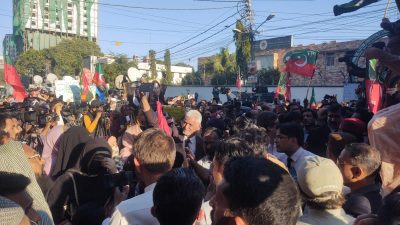By Syed Atiq ul Hassan, Sydney Australia
The pillars of governance in Pakistan must acknowledge the nation’s factual mandate and confront ground realities to steer the country away from further turmoil and financial crisis.
Recent revelations by officials like Commissioner Liaqat Chattha in Rawalpindi shed light on the egregious theft of public mandate by Returning Officers and election commission staff during the February 8, (2024) elections. It is imperative for the Chief Election Commissioner, Chief Justice, and Chief of Army Staff to intervene to prevent further electoral rigging and uphold the sanctity of democracy.
The widespread rigging and electoral malpractice exposed during the Feb 8 (2024) elections have brought shame to Pakistan’s democratic system. Despite international scrutiny and evidence of rigging, the Chief Election Commissioner (CEC) and Chief Justice have remained silent, failing in their duty to safeguard democratic principles. Recent reports of ballot papers manipulation and vote count alterations demand immediate action, including the resignation of responsible officials and the annulment of rigged election results.
In light of Commissioner Rawalpindi (Punjab) Liaqat Chattha’s statement in front of the media, and damning evidence of electoral fraud, it is incumbent upon the CEC and CJ to take responsibility for their failures and step down from their positions. The establishment and caretaker government must acknowledge the forgery perpetrated by the Election Commission Office and take decisive action to restore public trust in the electoral process.
Another eye-opening and evidence of changing the vote counts is a bombshell report broke out in the social media with video clips that ballet papers were printing in one of the printing-press in Lahore to add in the ballet of Nawaz Sharif vote counts. These heinous crimes are enough for EC and CJ to resign for their position immediately and null and void the election results on the rigging seats.
The fear among Pakistan’s establishment and ruling elite regarding Imran Khan’s political ascent underscores his status as an indispensable figure in Pakistani politics. Recognized as a visionary statesman and political reformer, Imran Khan has mobilized the youth and instilled a sense of civic responsibility, challenging the entrenched power structures of military, feudal, and business interests. Khan’s leadership has galvanized the nation towards a democratic future based on meritocracy and accountability.
statesman and political reformer, Imran Khan has mobilized the youth and instilled a sense of civic responsibility, challenging the entrenched power structures of military, feudal, and business interests. Khan’s leadership has galvanized the nation towards a democratic future based on meritocracy and accountability.
The international community acknowledges the significance of Imran Khan’s leadership for the people of Pakistan. His remarkable credentials as an anthropologist, statesman, and political reformer have set him above all political pundits in Pakistan. Through his actions, Imran Khan has instilled in Pakistanis the belief that every setback holds within it the seeds of triumph, and that truth can often be obscured by falsehoods.
Imran Khan’s journey from the realm of cricket to the domains of healthcare, education, and politics has been a beacon of service to the nation. He has not only raised awareness but also charted a course for progress in these critical areas. His leadership has compelled even the most entrenched figures in Pakistan’s power structure, including army generals, bureaucrats, judges, and political commentators, to confront their own shortcomings and acknowledge the need for change.
Today, from Gilgit-Baltistan to Karachi, there is a growing sense of national identity and unity among Pakistanis, who stand united behind Imran Khan in their quest for a brighter future. In Imran Khan, Pakistan has found a leader akin to its founding figures like the founders of Pakistan – Quaid-e-Azam Muhammad Ali Jinnah, Liaquat Ali Khan, and Ms. Fatima Jinnah, – bestowed upon them by divine providence after seven decades of yearning.
Internationally, Imran Khan is recognized as a catalyst for reform. His transition from the cricket field to championing causes of welfare, healthcare, and education exemplifies his commitment to social progress. His unwavering dedication to transforming the political landscape through a tireless struggle against the status quo has not only awakened the conscience of the Pakistani populace but has also delineated the fine line between truth and deceit.
Today, the echoes of change reverberate from the northern highlands to the southern shores, and from the eastern borders to the western frontiers of Pakistan. The once unassailable pillars of power now tremble, as army generals, judges, and bureaucrats reckon with the winds of change. Dishonest and discredited political figures contemplate their exit from the scene as the momentum for reform gains traction.
The tide of change is palpable in Pakistan, and the journey towards its envisioned destiny draws near. As long as the people of Pakistan continue to stand in solidarity, the nation will undoubtedly realize the aspirations envisioned by its founding father, Quaid-e-Azam Muhammad Ali Jinnah.
Pakistan stands at a crossroads, where the choices made by its ruling institutions will determine the trajectory of its democracy. Embracing transparency, accountability, and the rule of law is essential to overcoming the challenges posed by electoral rigging and entrenched interests. Imran Khan’s leadership symbolizes the aspirations of a new Pakistan, where the will of the people prevails over the vested interests of the few. It is imperative for all stakeholders to prioritize the nation’s welfare above personal agendas, paving the way for a truly democratic Pakistan.
(The writer is a Sydney-based journalist, political analyst, writer and a commentator. He is also editor, Tribune International Australia. His email is shassan@tribune-intl.com ).
END




